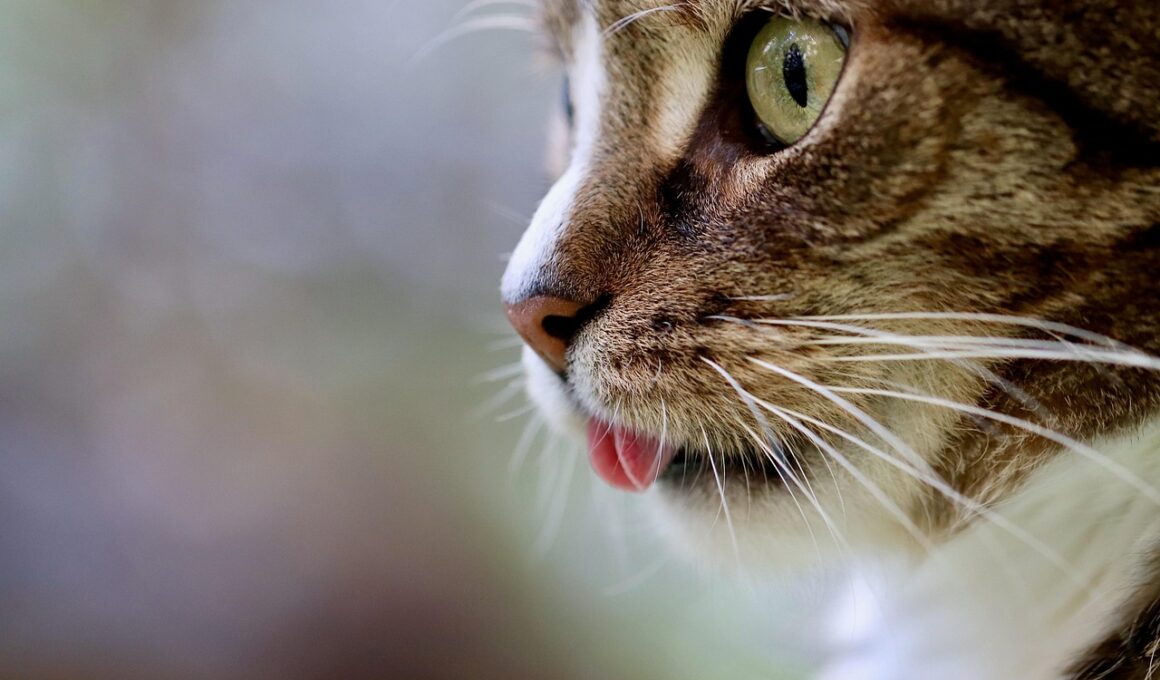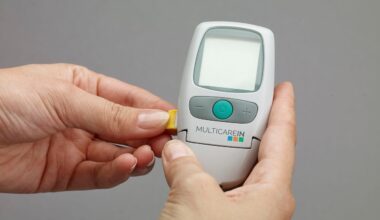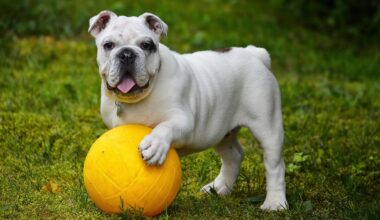Top Nutrient Deficiencies Affecting Elderly Cats
As your cat ages, nutritional needs change significantly, making it essential to address nutrient deficiencies efficiently. Senior cats often require tailored diets enriched in antioxidants and essential nutrients. A common issue among older felines is a deficiency in Vitamins E and C, which are vital for their immune system. Insufficient vitamin intake can affect their overall health and healing processes. Additionally, B vitamins contribute to energy levels and cognitive function, yet older cats may not absorb these nutrients effectively. Incorporating high-quality commercial cat food that includes these vitamins can help ensure your feline friend receives necessary nutrition. Consider wet food options that can enhance hydration and help with digestion too. Regular check-ups with the vet will help monitor and adjust your cat’s dietary needs as they age. Supplements may be recommended by your veterinarian to address specific deficiencies. By keeping close tabs on your senior cat’s diet, you’ll be better equipped to provide the nutrients needed for a happy and healthy life. Remember, proper nutrition is a fundamental aspect of senior cat well-being, so invest time in understanding their changing dietary requirements.
One of the most common deficiencies seen in senior cats is that of protein. Older cats need higher protein levels to maintain muscle mass and overall health. However, many commercial diets are not designed with older cats’ needs in mind, leading to insufficient protein intake. A lack of quality protein can lead to weight loss, lethargy, and diminished viability. It’s crucial to feed senior cats protein-rich foods, focusing on animal sources that are highly digestible. Look for cat food where meat is the first ingredient. This approach helps in nursing the way their bodies cope with aging. Furthermore, hydration must not be overlooked, since elderly cats often experience lower thirst drive. Including high-moisture diets, either through canned food or adding water to dry kibble, can combat dehydration-related issues. Always inquire about your cat’s specific needs with your veterinarian, who can offer tailored dietary advice. Adjusting proteins alongside hydration can significantly improve an older cat’s quality of life. Make sure you observe changes in behavior as well, as these can signal nutritional deficiencies that require attention.
Essential Fatty Acids
Omega-3 and Omega-6 fatty acids are crucial for senior cats, yet deficiencies often occur due to aging metabolism changes. These fatty acids support skin health, coat quality, and joint function, which are commonly affected as cats grow older. Older felines may suffer from skin dryness and hair loss due to insufficient fats in their diet. Including fish oils or flaxseed oil in their meals can enhance their skin condition and improve their overall appearance. Furthermore, these essential fatty acids aid in reducing inflammation and support cognitive health, which can help with age-related conditions. It is wise to gradually introduce these oils into the diet to allow the cat’s digestive system time to adjust. Speak with a veterinarian before starting any new supplement to ensure it complements their overall health plan and nutrition. Frequent adjustments may be necessary as your cat ages, making regular discussions with a vet imperative. Investing in good quality cat food rich in essential fatty acids greatly contributes to long-term well-being and comfort.
Mineral deficiencies also play a significant role in the health of senior cats. Key minerals like calcium, phosphorus, and potassium are vital for bone and muscle health. As cats age, their ability to absorb these minerals may decline, leading to conditions such as osteoarthritis or muscle atrophy. Regularly monitoring your cat’s mineral intake through a well-balanced diet can help prevent such issues from arising. Opt for food with natural sources of minerals, and consider mineral supplements if recommended by your veterinarian. It’s essential to calculate the appropriate dosages, as over-supplementation can lead to toxicity and further complications. Organic, high-quality feline food typically contains the right balance of minerals required for aging cats. Also, ensure that their diet has a proper calcium to phosphorus ratio as this supports overall bone structure and health, especially if your cat is prone to bone issues. Regular vet visits and adjustments based on laboratory tests will offer valuable insights into your cat’s specific mineral needs and any at-risk conditions.
Vitamin Deficiencies
Another critical area of concern in senior cat nutrition revolves around vitamin deficiencies. Vitamins play an important role in various bodily functions, yet older cats often struggle to retain proper vitamin levels. Vitamins A, D, and E are particularly essential for maintaining healthy living. For instance, vitamin A supports vision and overall health, while vitamin D regulates calcium within the body, which is vital for strong bones. A deficiency may lead not only to physical ailments but also to adverse changes in behavior and cognition. Older cats may not easily synthesize certain vitamins, making it important to feed them diets fortified with these nutrients. Consult a veterinarian to determine if your cat needs specialized food or supplements to fill any gaps. Always opt for premium, well-formulated cat food with high vitamin content to safeguard against deficiencies. Regular dietary adjustments and an understanding of your cat’s specific needs are the foundations to maintaining longevity and quality of life for your feline friend.
Lastly, keeping your senior cat’s gut health in check is crucial as ignorance can lead to severe nutrient deficiencies. A healthy gut is necessary for the absorption of many essential nutrients and vitamins. Probiotics can help maintain gut flora, but elderly cats might not consume enough via their diets alone. They could suffer from gastrointestinal problems that hinder nutrient absorption. When changing diets, it is good practice to incorporate probiotics gradually to avoid upsetting their stomachs. Foods rich in prebiotics, such as beets and chicory, can also improve gut health. Nonetheless, it is essential to be cautious and consult a veterinarian before introducing any new dietary changes. Focus on incorporating high-quality ingredients that are easy to digest while supporting their digestive health. A well-balanced gut translates to higher nutrient availability, contributing significantly to their overall health. Proper nutrition and attention to digestive issues will enhance your senior cat’s quality of life, allowing them to enjoy their golden years fully. So prioritize their gut health along with comprehensive dietary attention.
Conclusion
To summarize, senior cat care requires diligent attention to their nutritional needs. Identifying and addressing nutrient deficiencies can dramatically improve their quality life and health levels. Keep a proactive approach by regularly consulting with veterinarians. Monitoring dietary adjustments based on your cat’s behavior and health is key. Focus on providing high-quality, balanced diets specifically formulated for seniors, enriched with essential fatty acids, vitamins, proteins, and minerals. This ensures that your feline friends remain active and healthy as they age. Encouraging good hydration practices alongside nutritious food can further support their liver and kidney functions, enhancing their longevity and wellness. Understanding the unique challenges faced by senior cats is essential for every cat owner. Taking preemptive measures against potential deficiencies will lead to a happier, well-nourished feline. Invest the time and research necessary to keep your senior cats thriving. This knowledge will serve as a valuable guide toward making better dietary choices for your cherished companions. Ultimately, a holistic approach to nutrition will ensure your furry friends remain vibrant and enriched in their later years.


